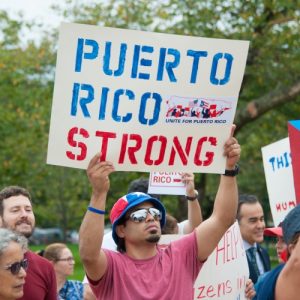“The tax bill levies a 12.5% tax on profits derived from foreign-owned intellectual property. The IRS considers Puerto Rico to be a foreign country, so any profits derived from IP in Puerto Rico would be considered foreign profits subject to the excise tax.”
 The year 2017 proved to be a difficult one for the territory of Puerto Rico. Even before Hurricane Maria hit in September of that year, the island was in trouble. By the end of year, the economy was predicted to shrink back to levels not seen since 2000, the average household income was a mere $19,350, one-half that of Mississippi, the poorest state in the nation. Meanwhile, the cost of living in San Juan, Puerto Rico’s capital, was 11.6% higher than in an average U.S. metropolitan area. The government was already dealing with $74 billion in bond debt and another $49 billion in unfunded pension obligations, with U.S. banks taking at least $1 billion to manage its bond sales.
The year 2017 proved to be a difficult one for the territory of Puerto Rico. Even before Hurricane Maria hit in September of that year, the island was in trouble. By the end of year, the economy was predicted to shrink back to levels not seen since 2000, the average household income was a mere $19,350, one-half that of Mississippi, the poorest state in the nation. Meanwhile, the cost of living in San Juan, Puerto Rico’s capital, was 11.6% higher than in an average U.S. metropolitan area. The government was already dealing with $74 billion in bond debt and another $49 billion in unfunded pension obligations, with U.S. banks taking at least $1 billion to manage its bond sales.
In the fall of 2017, after Maria hit head on as a Category 4 hurricane that caused catastrophic damage, the second blow to Puerto Rico was brewing—this time in Washington. The Republicans, being in control of the House, Senate, and the White House, drafted a tax reform bill that proposed the biggest change to the tax code in 30 years. Within that tax bill was a provision that was predicted to decimate what is left of Puerto Rico’s remaining economy.
A Tax on IP
The tax bill proposed, and ultimately the President signed into law, a provision that levies a 12.5% tax on profits derived from foreign-owned intellectual property. This hits Puerto Rico in two ways. First, Puerto Rico has a complicated taxation relationship with the United States. Its citizens do not pay federal income taxes, although they do pay into Social Security. However, when it comes to taxation, the IRS considers Puerto Rico to be a foreign country. Thus, any profits derived from intellectual property in Puerto Rico would be considered foreign profits subject to the excise tax. The second problem is that Puerto Rico derives a great deal of its revenue from the manufacturing of prescription drugs, representing the very profits from intellectual property contemplated in the law. According to the U.S. Bureau of Labor Statistics, pharmaceuticals account for 72% of Puerto Rico’s 2017 exports, which was valued at $11.5 billion.
Prior to the new tax law, Puerto Rico aggressively courted pharmaceutical companies to bring their operations to the island because of the significant tax savings. U.S. companies would purchase the manufactured goods from their “foreign” Puerto Rico subsidiary, pay a 4% excise tax to Puerto Rico, and call it a day, as long as the profits from the subsidiary were kept in an offshore account. Puerto Rico was incredibly successful in exploiting this tax paradise to lure in pharmaceutical companies and the Food and Drug Administration has estimated that these profits make up almost 30% of Puerto Rico’s gross domestic product (GDP).
It is no surprise, then, that a 12.5% excise tax—more than double what companies were required to pay in 2017—would be alarming to Puerto Rico. At the very least, the concern is that other pharmaceutical companies would not choose to bring their operations to Puerto Rico, and of even greater concern is that companies who are there now will move their operations in search of more favorable tax treatment. With an estimated 250,000 Puerto Ricans employed directly or indirectly by the pharmaceutical industry, even the loss of one company could be devastating.
The underlying purpose of the overhaul of the excise tax was to close off avenues for U.S. companies to use foreign subsidiaries to avoid paying higher taxes on their intellectual property profits. Puerto Rico has been a very attractive place to do this. For example, in 2012, the U.S. Senate investigated Microsoft’s use of this tax haven and found that while the company had only 177 workers in Puerto Rico, it funneled $4 billion in profits through the country to take advantage of the 4% taxation rate by selling its intellectual property to the “foreign” Puerto Rican subsidiary.
Open Questions
While in the immediate aftermath of the announcement on the change in tax status for intellectual property profits, no drug manufacturers indicated they would leave the island, this may have been in part because they were still struggling to even begin manufacturing again at all. Drug shortages have been a consistent problem in the U.S. as these plants have worked to get back online with generators for power and other problems.
Some have pointed out that the damage could have been worse. The House version of the bill called for a 20% excise, which was reduced when the bill was negotiated with the Senate version. Still, even a 12.5% tax could be enough to deter other manufacturers from coming to the island, especially in light of the epic destruction of the utilities and the exodus of 200,000 residents from the island to Florida due to the conditions. Puerto Rico was already experiencing a population decline before Maria, and the storm is predicted to speed up the process.
While members of the Senate from Florida and other states with heavy Puerto Rican populations have called to repeal some of the provisions, it is unclear whether this will happen or what the final toll of the damage will be. This is the first year that taxes are affected by the 2017 GOP tax law, so how much hardship will be dealt to Puerto Rico’s economy and whether the territory can offset those losses through different avenues of economic development remain open questions.
Image Source: Deposit Photos
Photo by renaschild
ID: 169464838

![[IPWatchdog Logo]](https://ipwatchdog.com/wp-content/themes/IPWatchdog%20-%202023/assets/images/temp/logo-small@2x.png)

![[Advertisement]](https://ipwatchdog.com/wp-content/uploads/2024/04/Patent-Litigation-Masters-2024-sidebar-early-bird-ends-Apr-21-last-chance-700x500-1.jpg)

![[Advertisement]](https://ipwatchdog.com/wp-content/uploads/2021/12/WEBINAR-336-x-280-px.png)
![[Advertisement]](https://ipwatchdog.com/wp-content/uploads/2021/12/2021-Patent-Practice-on-Demand-recorded-Feb-2021-336-x-280.jpg)
![[Advertisement]](https://ipwatchdog.com/wp-content/uploads/2021/12/Ad-4-The-Invent-Patent-System™.png)







Join the Discussion
One comment so far.
Luis Figarella
April 23, 2019 08:55 amGracias Franco, like all things having to do with the PR ‘Tax Haven’, there are side effects that are not ‘just’ limited to Pharma. All remnants of the 936 Code seem to qualify. (My dad worked for Union Carbide in Puerto Rico 1968-1992, and as a child I visited EVERY pharmaceutical plant when they were just trailers).
In a move that directly distorts my annual ‘State of PR IP Survey’, the medical device firm Ethicon has been doing something similar, transferring their US Patents to their PR subsidiary. Suddenly in 2016, PR went from ~75 issued patents per year to over 200! But alas, once we checked from where, Ethicon accounted for 150+ per annum. In fact, they are up to 149 to date in 2019! I am sure their legal dept. reads IPWatchdog, let’s see their year end totals!!!
Keep them coming, all of us who love our ‘terruño’ like keeping it in the news.
Luis